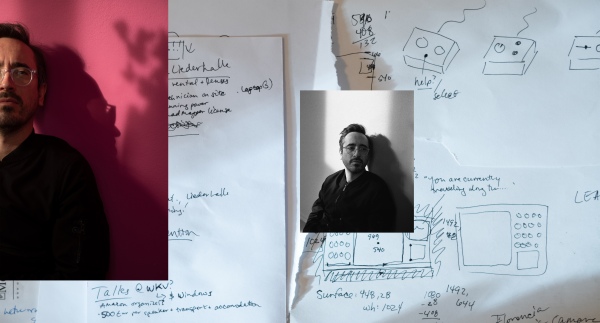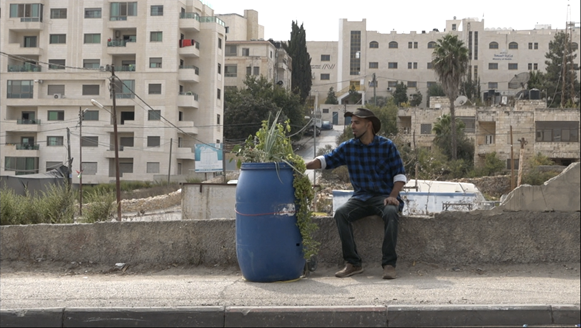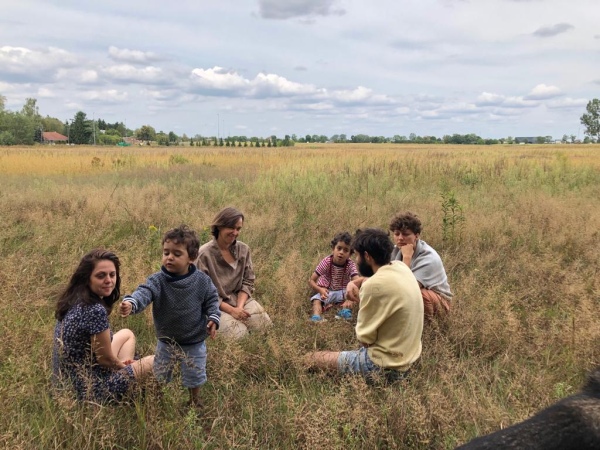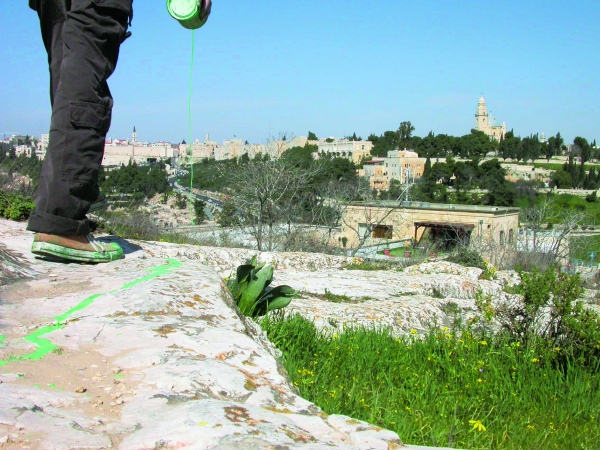A place which can heal
Mohammad Saleh in conversation with Bogna Świątkowska
-
Bogna Świątkowska: How did it happen that you decided to focus on gardening?
- Mohammad Saleh: The short answer is that it all started from passion. I never thought that this passion would turn into a profession, the thing that I do full-time, but it did. What triggered this passion was my realisation that going hand in hand with nature can contribute positively to two of my main interconnected concerns, one global and the other local to Palestine. Globally, by counteracting the disruption of nature, and locally, that self-sufficiency can empower the vulnerable Palestinian society, one person at a time. Gardening happened to be just one part of the holistic permaculture approach to a regenerative human life.
-
What did you do before?
- I studied psychology and musicology. It took me a long time to finish. After I finished, I was looking for jobs and, mostly by chance, started working as a coordinator in an art organisation. Sometime later, my partner received a scholarship in Turkey. We went there together and, while she was busy with her studies, I lived off the grid, in touch with nature on a farm. I was a volunteer there, provided with food and accommodation in exchange for work. And there, suddenly, I found meaning, and I loved it! I can now look back and say that my holistic health, psychological and bodily wellbeing was really good there. I would take care of chickens, cultivate a garden, drink from the river, make a fire, etc. There was no bright light after sunset. Celebrating all the beautiful things of nature changed my life perspective. After three months of being a volunteer, I became the manager there for the next three years. It was actually less a farm and more of an ecological education centre. People from all over the world came there for two reasons: either to volunteer, or to participate in the courses of The Life School. There were courses ranging from simple things like making compost, all the way up to quantum physics and everything in between, such as homeopathy, nature photography, bird watching, alternative education, etc. A whole spectrum of things that, for a city person like me, were simply mind-blowing. It opened up all the windows and doors for me to empowering tools I had never heard of or thought of to search for. My partner joined and moved in with me, my son was born there and his education was Montessori-inspired. Now my partner is a consultant of that, because we really believe in this bottom-up approach rather than top-down education.
- I took this passion with me from Turkey to Palestine in 2015. I wasn’t sure whether there would be any chance for me to keep on practicing as I had been. The first thing I did was search for like-minded people. I searched on the internet: who was caring about nature, and what were they doing? I found a lot of projects, so I started visiting them. Meanwhile, I made a garden for myself, which people saw in photos and started asking me to make gardens. In the beginning the pay was low and there was a lot of doubt. I wasn’t sure if I was able to do it right, despite years of practice and a Permaculture design certificate. And now, 4 or 5 years later, I practice this full time. I call my initiative Mostadam, which means sustainable. I run a one-person social enterprise. Through that enterprise, people ask me to carry out all kinds of eco projects. Lately, I started feeling like the eco genie of the community, fulfilling various and varied wishes, like a greenhouse on the roof, a grey water system, an urban farm, aquaponics systems, geodomes, training sessions, etc.– all kinds of things that I had no previous experience with. I experiment and I learn. I study a lot. And I feel a responsibility to make this service available to local people, because one thing I realised after going back to Palestine is that every person there – poor, rich, foreign, local, young, old, you name it – they all long for a green space. A place where they can heal and feel good.
-
Why is it that Palestine seems to be so disconnected from nature?
- Palestinian culture has its roots in nature. Farming originally started by growing wheat about 10 millennia ago, precisely in the Fertile Crescent we are a part of. According to science today, the clay pot or clay irrigation is the most efficient irrigation system, and it was invented in this land about 4000 years ago. We are rooted deeply in the land, but today many things are causing that to change: the international problem of capitalism, consumerism, inviting everybody to the city, etc. In addition, there is the occupation. The Israeli occupation uses many ways to break this connection with the land. One of them is dividing the West Bank into 3 areas, where Area A is more or less where people live, area B is the margins of populated areas, and area C is all the things in between, which is basically nature: wilderness and olive orchards, for example. People are hardly allowed to build or farm there. Often you’ll find settlers or army machines will come and uproot your trees, demolish structures, attack you while you are picking your olives and so on. So there is a great strain limiting rural life and farming. Regarding city people, the majority are just like city people all around the world – disconnected from nature.
-
What is the relationship between land and soil in Palestine? The land in terms of vast territories is connected with the land in terms of soil. You are, in a way, creating brand new territories through your project, because you are creating soil for plants to grow in.
- In a pot, yes. This applies especially to the work I did about refugees who had lost everything, like my family. The people who live in refugee camps 70 years later, 4th generation, 5th generation – they know nothing about this land, because they have never lived on it. I was raised repeatedly hearing about the land, the land, the connection to the land, defend the land, the land is your dignity, etc. I didn’t really get it as a city boy and the grandson of misplaced refugees. Not at all. I had no contact with it until I planted some trees when I was 30 years old! It was when I came back to Palestine for 2 months so my son could be born there. I planted this garden and then I left again. And as soon as I left, I, for the first time ever, felt that I wanted to go back. Before, when I used to travel, I would not care about going back to Palestine. I would rather just stay outside. But all of a sudden, having planted 13 trees, I found myself so attached to this tiny garden. For one year I had my family-in-law send me photos and videos and doing things there. I couldn’t detach myself from these babies that I had planted. It was only then that I realised what the older generation meant by the land. You cannot have a genuine connection with the land without dealing with it, touching its soil. It is a fully alive entity. Just recently, in my research I came upon the topic of teaming up with microbes. Soil microbiology. I realised that all the major permaculture techniques I had learned in the past decade only make sense because of something very small that the eye can’t see – bacteria and fungi etc. They live in the soil and create a kind of food web. One spoon of soil is a whole galaxy. It is so full of life. So imagine a garden that you treat well. In the book I was reading, they compare living soil and dead soil, i.e. full of chemicals, pesticides, herbicides and all that. It is completely barren and the plants in it don’t live a life, they are just in something that holds them up but that’s not what the soil is supposed to be. So the land is not only a medium, it is life. I became very passionate about what we don’t see, and when I share this with people I use cultural metaphors to make it easy to grasp. For example, to religious people I say: in your religion it is said that God places his secret in his weakest creations. Nothing can live and sustain itself without these microbes that we don’t see. Our stomachs are full of them. We are soil ourselves. I want people to feel that nature is alive. When I say that plants gets stressed, they start to laugh: the plant needs a psychologist. They don’t see a plant as a living being. To them it’s a statue or something. A plant needs much more than nutrition, it needs nourishment, it needs life, coexistence, relationships. It doesn’t pump solar power just for itself.
- I would like to become a microbe, to enter the soil and see what is going on there. It is beautiful and we need to protect it and team up with it. Maybe when we are able to celebrate such forms of life, we will not need to make wars, we can tap into great potential. It seems so logical to me to bring it closer to everybody, for the sake of nature and for the sake of people’s freedom.




